Michael Swanwick's Blog, page 16
August 25, 2024
Remembering Frog City
.
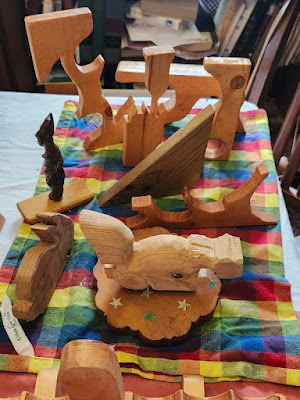
Look what Sean found in the basement! A plastic tub containing his blocks from back when he was a little boy. Shown above is only a small fraction of them. The rest are still in the tub.
You'll have noticed that these aren't ordinary blocks. Our friend, Gene Olmsted, was making wooden toys at the time, and he dropped off a huge bag of wood scraps, thinking we could burn them in our wood stove.
Instead, Sean and I built a towering edifice on the kitchen table (Sean did most of the design work; I was grunt labor), a mighty city hours in the making that involved every single wooden block we had. Then, when it was done, Sean placed an origami frog at its heart explaining that, "The city is so powerful that it can only be ruled by The Frog!"
Imagine Marianne's astonishment when she came home from work that evening.
And, as sometimes happens . . .
Years later, I met Pete Abrams, the illustrious artist-cartoonwriter of Sluggy Freelance. When he offered to draw one of his characters, I requested Frog, who is small, angry, very articulate, occasionally evil, and a frog. Then I told him the above story to explain why.
Pete remembered the story, too. I know because in a later comic, he claims a city, saying that "It is so powerful that it can only be ruled by the frogs!!!"
Alas, Frog's claim on the city only lasted for a panel or two. At the time, I very much wanted to buy the original of that particular strip but couldn't figure out how to get in touch with Abrams.
Oh, well. At least Sean and I got to make a small contribution to Web comics culture. I'm proud of that.
*
August 20, 2024
"Elle nous a épargné une Troisième Guerre mondiale"
.
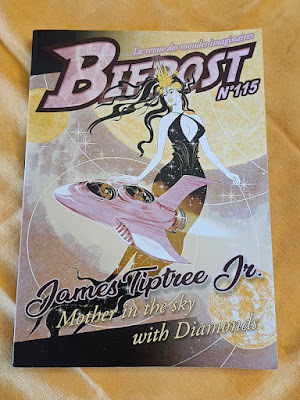
I'm in print again! Well, sort of. The French SF magazine Bifrost has a special section in issue 115 dedicated to James Tiptree, Jr./Alice Sheldon with many articles about her work and life. One of which, titled "Elle nous a épargné une Troisième Guerre mondiale: Gardner Dozois se souvient," is an excerpt from an interview I did with Gardner about his friendship with Alice Sheldon, by correspondence until her pen name was stripped away from her and she was revealed to be a woman, and also by phone afterward. (She would call him up occasionally late at night when holding a gun and contemplating suicide.) The full interview appeared as a chapbook by Henry Wessells' imprint, Temporary Culture, under the title She Saved Us from World War Three.
The title is not an exaggeration. Sheldon was working as a photo analyst for the CIA when suddenly missile launchers started appearing across the Siberian tundra. The experts were panicking and prepared to recommend a defensive first strike against the USSR. But Sheldon was able to prove that the "missile launchers" were actually hay ricks.
Which may make her the most important science fiction writer ever--though not for her science fiction, impressive as it was.
And if you're curious . . .
There are still, as of this posting, 26 copies available of the Temporary Culture chapbook. It's an interesting item, containing not only my interview with Gardner but also two letters that Sheldon wrote, one revealing her gender and another expressing her relief that he was still her friend. The letters are also reproduced (with Tiptree's signature purple typewriter sink) in fold-out form.
If this is the sort of thing that interests you, can find more information here.
And, incidentally . . .
I interviewed Gardner about his relationship with Tiptree and Sheldon in 2015. Three years later, Gardner Dozois was dead. If you know someone whose memories should be preserved, I urge you to hop to it. The years slide by more quickly than you'd think.
*
August 14, 2024
Two One-Day E-Book Sales for IN THE DRIFT and THE IRON DRAGON'S DAUGHTER
.
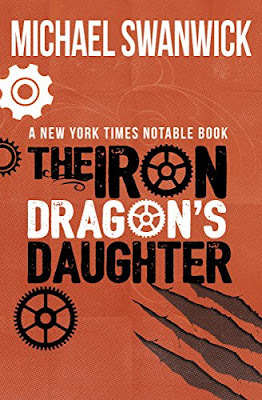
As happens pretty often, Open Road Media, which publishes several of my e-books, is having one-day sales:
This Friday, August 16, my first novel, In the Drift, goes on sale for $1.99 in the US only.
And this Saturday, August 17, The Iron Dragon's Daughter, goes on sale for $1.99 in the US only.
And while you're buying books by me . . .
Don't forget the Dragonstairs Press will place its newest chapbook, Brief Lives, on sale this Saturday at noon, Philadelphia time. This is a collection of five abbreviated biographies and one anecdote of six writers who were among the saints and martyrs of twentieth century literature. Some succeeded and others did not. But they all gave everything.
Only 40 chapbooks were made and several were given away. $11.00, shipping included, in the US. Slightly more outside the country. So be sure to set your alarm clocks. This one will sell out fast.
*
August 12, 2024
Coming Saturday from Dragonstairs Press: BRIEF LIVES
.
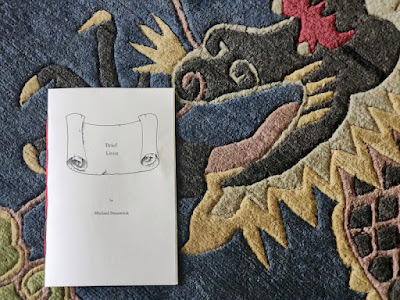
Dragonstairs Press, the micropress--or as she herself calls it, "nanopress"--owned and operated by Marianne Porter, has announced the impending sale of their latest chapbook, Brief Lives, written by yours truly.
Here's the announcement:
The lives of six writers, some you've heard of and others you have not, are quickly summarized in Michael Swanwick's Brief Lives. These are the saints and martyrs of literature. Some triumphed, some did not. All of them gave their all.
Issued in an edition of 50, and first distributed at Swanwick's kaffeklatch at the 2024 NASFiC. 38 are offered for sale at www.dragonstairs.com, on Saturday August 17, 2024, at noon Philadelphia time (Eastern Daylight Savings).
5 1/2” by 8 1/2”, handstitched, numbered, and signed by the author.
The writers, to satisfy your curiosity, are:
Edward Mott Woolley
Judith Merril
William Fitzgerald Jenkins
Anna Quinsland
Octavia Butler
Jack Woodford
Four of these lives were published some time ago in The New York Review of Science Fiction and have since been lightly revised, and two were written to fill out the chapbook. Of these, it must be admitted that the entry for Judith Merril was more anecdote than biography.
And don't forget . . .
If you want a copy of the chapbook, remember to set your alarm clock. Only 38 copies will be available for purchase, and at $11.00 domestic (postage included) and only slightly more outside the US, it's expected to sell out quickly.
*
July 21, 2024
Congratulations to Sergio Rebolledo!!!
.
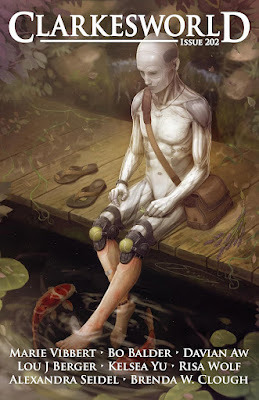
I confess that I was not aware of the Frank R. Paul Awards science fiction art, which were given annually by the con committee of Kubla-Khan from 1976 through 1996. And which have just now been resurrected, thanks to the efforts of Frank Wu and friends. But I learned of them yesterday, when Neil Clarke (of Clarkesworld) introduced me to artist Sergio Rebolledo, who was a nominee. Like Neil himself, Sergio is quite a likeable guy.
The awards were announced at the Buffalo NASFIC last night. On the road, with the con behind me, I logged onto the Internet and discovered that the winner for Best Magazine Cover was Rebolledo. That's it up above.
Which makes that brief encounter one of the highlights of the NASFIC for me.
I should mention that the winner for Best Book Cover was Kurt Miller for Lineage: Ravages of Honor, Book 3. You can see the cover and/or buy the book here.
You can read the entire list of nominees and honorable mentions here.
And if you're wondering who Frank R. Paul was . . .
Shame on you! Frank R. Paul was the single best cover artist of the Hugo Gernsback era, responsible for images that were vivid, exciting, and absolutely gonzo.
I recommend you go to Google Images and search for his images. You won't be disappointed.
*
July 15, 2024
E-Book Sale! In the Drift! Thursday Only!
.
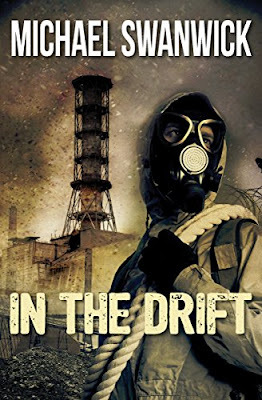
As happens often enough Open Road Media is placing my first novel, In the Drift on sale for one day only. That's $1.99 on this Thursday, July 18, 2024 in the US only.
And if you're curious about the title . . .
The novel is set in the aftermath of a full meltdown at Three Mile Island. Most of Pennsylvanis is uninhabitable, Philadelphia is ruled by Mummers, and the uninhabitable area is known as the Drift. Because it's where radioactive isotopes have drifted and fallen to earth. When I was writing it, the book was titled The Drift. It was bought for Terry Carr's Ace Specials line and promptly re-titled In the Drift.
When I asked why the change, I was told that my title sounded like a horror title, like The Fog et al. Fair enough. I didn't much like the title but, not having a better alternative to offer, I went with it.
(Background info: The book was a fix-up of three sequential novellas with connective material. The first novella was titled "Mummer Kiss.")
Time passed. The novel sold to France. I got a copy of the translation. They had re-titled it Baiser du Masque. I got out my French dictionary to see what that meant.
Mummer Kiss. The perfect title was staring me in the face all along.
*
Smek.
July 14, 2024
Alvaro Zinos-Amaro and Me on the Coode Street Podcast
.
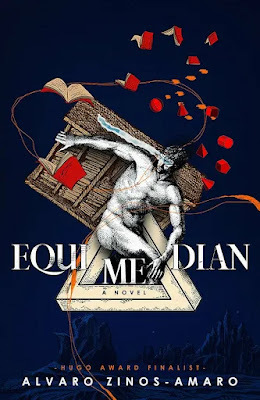
Alvaro Zinos-Amaro's first novel, Equimedian, has been described as "a love letter to the SF of the '70s and '80s." Which I suspect is going to be the standard description of this book. So Gary K. Wolfe and Jonathan Strahan invited Alvaro to discuss it, along with last year's non-fiction book-length interview with me, Being Michael Swanwick on their Coode Street Podcast.
I was a participant in the conversation, so I realize that you're going to take my recommendation with a grain of salt. But I think it was pretty darn good--and I've been in enough public conversations where I was less than stellar to know the difference.
If you're curious, you can find the podcast here. You should check it out. It's an hour well wasted.
And . . .
Just to be clear, I greatly enjoyed Equimedian. You don't need to know science fiction in the extraordinary depth that Zinos-Amaro does to appreciate it. And the completely satisfying ending took me by surprise. You have no idea how rarely a book does that.
As for Being Michael Swanwick, it's a story-by-story examination of every work of short fiction I ever published as of when the book came out. And now you know whether you want to read it or not. Nothing I could say would change your decision one way or the other.
Isn't that charmingly modest of me? I am the king of the soft sell!
*
July 9, 2024
What I'm Currently Working On
.
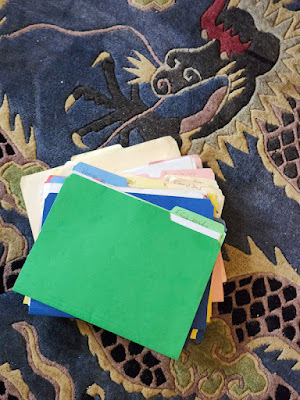
As a writer, you get used to it. An old friend says hi, and then immediately follows up with, "What are you working on?"
When I'm partway through a novel, the answer is easy. Because writing a novel is an all-consuming thing. I might be able to squeeze in a short story, written piecemeal in those random bits of dead time when I'm not researching, writing, editing, or revising the novel. But it's just a sideshow.
Right now, however, I still haven't decided what my next novel should be. So, pictured above, is the stack of files containing close to everything I'm working on at the moment. That comes to:
Four novel openings, ranging from 8 to 49 pages.
One essay.
One book introduction (for a reprint of somebody else's book).
Two beginnings of collaborative stories that may or may ever happen. The Eileen Gunn one will have to wait for her to finish her novel.
Five partially written short stories.
A file of six (one to two page) story openings: "Saint Jerry the Hermit," "Two Riders," "The Werewolf in Winter,""Dinosaur on the Moon," "The Water People," and "Mercury is Hell."
"The Werewolf in Winter" may well get written someday, just because that's a nifty title. The other brief story openings, probably not. The rest (with the exception of one-to-three novels) will all certainly be done someday, though it may take quite a while for some of them.
Right now, I grab the stack of files, look through it to see what I feel like working on, then sit down and add a page or six, or possible a paragraph, or else, like Oscar Wilde, I may laboriously remove a word I'd previously spent a day inserting. This is the glamour and magic of an author's life.
It's not the best way to write. (It can't possibly be!) But it's the one I'm stuck with.
*
July 2, 2024
Rhymer by Gregory Frost (A Review)
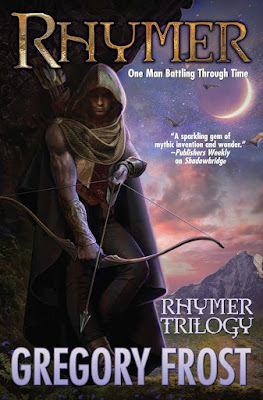
Today, I'm posting a straightforward book review of a fantasy novel I admire a great deal...
Rhymer by Gregory Frost (Tor Books)
GregoryFrost’s Rhymer is easily the best thing I’ve read in the past year. It’sa… and already I’m having trouble finding the right descriptors. Initially, itlooks to be a Celtic fantasy, with Thomas the Rhymer waging a one-man waragainst all Faerie. But the elves, it turns out, are an invading alien speciesfrom another dimension, so it’s actually science fiction. Oh, and because Frostkeeps the historical events consistent with those we know, it’s also a secrethistory. And the elves themselves are straight out of a horror novel. But itcould also be that it’s actually an alternate history.
Let mestart over again.
ThomasLindsay Rimor de Erceldoune is mad, to begin with. Mad and cursed with the giftof prophecy, he is clearly a precursor to or avatar of Tom O’Bedlam. One night,the Queen of Faerie comes hunting with her elf-troop and takes True Thomas’sbrother away with her as a sacrifice to the Teind. On a whim, she cures Tom ofhis madness (but not his visions, which take the form of epileptic seizures andprophesies he cannot understand). This, as it turns out, is the biggest mistakeshe will ever make.
Thenewly-rational protagonist learns of the elven/alien plot to firstreverse-terraform and then take over our planet. Being immortal, they can taketheir time. Being shape-shifters, they can assume powerful positions in humansociety. To oppose them, Tom must first learn how to use weapons. And beforethat, because even a hero must eat, he must learn a trade, that ofstone-cutter.
Everyoneknows the pleasures we expect from an action-adventure novel and Frost deliversthem most ably. But he’s also too canny a writer to give you exactlywhat you’re expecting. Through all the many twists and turns of plot, hecarefully avoids those that have grown trite and predictable through overuse. Andthough True Thomas is the hero his world needs—experiences he’d much rather haveavoided have made him immortal and given him the elven power of glamour—he’salso a convincing human being in a world that is recognizably our own. He hasfriends and family and loyalties and, in the course of events, a wife.
This wifeis Janet of the green kirtle who, in the Child ballad “Tam Lin” (Thomas hasmany names in the course of his long life), saves her own true love from theFairy Queen, and she is one of the most engaging aspects of this novel. Notonly is she stalwart and capable enough to rescue Thomas from the darkest nightof his soul but she is convincing as his spouse as well. They two form aworking marriage, a union of peers whose support for each other strengthens themboth. And how often do you see that in a fantasy novel?
There isso much to praise about Rhymer! All the characters in it ring true. Thestonemasons sound like working class men. (When Thomas’ mentor, Alpin Waldroup,is asked in what battle he was injured, he replies, “Has it a name? I neverheard it.”) The elves are everything that’s wrong about aristocrats, and thensome. The worldbuilding, both of Faerieand the Scottish Borders, is exemplary. I could go on and on. Suffice it to saythat Gregory Frost has done the hard work that is the making of a great bookand reimagined everything about it afresh. This is one hell of a satisfyingnovel.
Much morecould be said. But I will stop here, before I drown you in a sea ofsuperlatives.
In the wayof such fantasies, there are two more volumes on their way. Rhymer: Hoode,in which True Thomas assumes the guise of a certain bow-carrying outlaw,available now, and a third book, which I understand will be set in Elizabethantimes, will follow soon. As of this writing, I am midway through the second andavid to read number three.
*
@font-face {font-family:"Cambria Math"; panose-1:2 4 5 3 5 4 6 3 2 4; mso-font-charset:0; mso-generic-font-family:roman; mso-font-pitch:variable; mso-font-signature:-536870145 1107305727 0 0 415 0;}@font-face {font-family:Calibri; panose-1:2 15 5 2 2 2 4 3 2 4; mso-font-charset:0; mso-generic-font-family:swiss; mso-font-pitch:variable; mso-font-signature:-536859905 -1073732485 9 0 511 0;}p.MsoNormal, li.MsoNormal, div.MsoNormal {mso-style-unhide:no; mso-style-qformat:yes; mso-style-parent:""; margin:0in; mso-pagination:widow-orphan; font-size:12.0pt; font-family:"Calibri",sans-serif; mso-ascii-font-family:Calibri; mso-ascii-theme-font:minor-latin; mso-fareast-font-family:Calibri; mso-fareast-theme-font:minor-latin; mso-hansi-font-family:Calibri; mso-hansi-theme-font:minor-latin; mso-bidi-font-family:"Times New Roman"; mso-bidi-theme-font:minor-bidi; mso-font-kerning:1.0pt; mso-ligatures:standardcontextual;}p.MsoListParagraph, li.MsoListParagraph, div.MsoListParagraph {mso-style-priority:34; mso-style-unhide:no; mso-style-qformat:yes; margin-top:0in; margin-right:0in; margin-bottom:0in; margin-left:.5in; mso-add-space:auto; mso-pagination:widow-orphan; font-size:12.0pt; font-family:"Calibri",sans-serif; mso-ascii-font-family:Calibri; mso-ascii-theme-font:minor-latin; mso-fareast-font-family:Calibri; mso-fareast-theme-font:minor-latin; mso-hansi-font-family:Calibri; mso-hansi-theme-font:minor-latin; mso-bidi-font-family:"Times New Roman"; mso-bidi-theme-font:minor-bidi; mso-font-kerning:1.0pt; mso-ligatures:standardcontextual;}p.MsoListParagraphCxSpFirst, li.MsoListParagraphCxSpFirst, div.MsoListParagraphCxSpFirst {mso-style-priority:34; mso-style-unhide:no; mso-style-qformat:yes; mso-style-type:export-only; margin-top:0in; margin-right:0in; margin-bottom:0in; margin-left:.5in; mso-add-space:auto; mso-pagination:widow-orphan; font-size:12.0pt; font-family:"Calibri",sans-serif; mso-ascii-font-family:Calibri; mso-ascii-theme-font:minor-latin; mso-fareast-font-family:Calibri; mso-fareast-theme-font:minor-latin; mso-hansi-font-family:Calibri; mso-hansi-theme-font:minor-latin; mso-bidi-font-family:"Times New Roman"; mso-bidi-theme-font:minor-bidi; mso-font-kerning:1.0pt; mso-ligatures:standardcontextual;}p.MsoListParagraphCxSpMiddle, li.MsoListParagraphCxSpMiddle, div.MsoListParagraphCxSpMiddle {mso-style-priority:34; mso-style-unhide:no; mso-style-qformat:yes; mso-style-type:export-only; margin-top:0in; margin-right:0in; margin-bottom:0in; margin-left:.5in; mso-add-space:auto; mso-pagination:widow-orphan; font-size:12.0pt; font-family:"Calibri",sans-serif; mso-ascii-font-family:Calibri; mso-ascii-theme-font:minor-latin; mso-fareast-font-family:Calibri; mso-fareast-theme-font:minor-latin; mso-hansi-font-family:Calibri; mso-hansi-theme-font:minor-latin; mso-bidi-font-family:"Times New Roman"; mso-bidi-theme-font:minor-bidi; mso-font-kerning:1.0pt; mso-ligatures:standardcontextual;}p.MsoListParagraphCxSpLast, li.MsoListParagraphCxSpLast, div.MsoListParagraphCxSpLast {mso-style-priority:34; mso-style-unhide:no; mso-style-qformat:yes; mso-style-type:export-only; margin-top:0in; margin-right:0in; margin-bottom:0in; margin-left:.5in; mso-add-space:auto; mso-pagination:widow-orphan; font-size:12.0pt; font-family:"Calibri",sans-serif; mso-ascii-font-family:Calibri; mso-ascii-theme-font:minor-latin; mso-fareast-font-family:Calibri; mso-fareast-theme-font:minor-latin; mso-hansi-font-family:Calibri; mso-hansi-theme-font:minor-latin; mso-bidi-font-family:"Times New Roman"; mso-bidi-theme-font:minor-bidi; mso-font-kerning:1.0pt; mso-ligatures:standardcontextual;}.MsoChpDefault {mso-style-type:export-only; mso-default-props:yes; font-family:"Calibri",sans-serif; mso-ascii-font-family:Calibri; mso-ascii-theme-font:minor-latin; mso-fareast-font-family:Calibri; mso-fareast-theme-font:minor-latin; mso-hansi-font-family:Calibri; mso-hansi-theme-font:minor-latin; mso-bidi-font-family:"Times New Roman"; mso-bidi-theme-font:minor-bidi;}div.WordSection1 {page:WordSection1;}
June 20, 2024
Happy Birthday, Karen E. Quinones Miller!
.

Once upon a time, there was a young woman from Harlem and the Bronx who, because she was intellectually gifted, was offered a place in an overwhelmingly white school. She didn't want to go. A family friend, Mr. Johnson, a nice man who loved children, asked her why not. Eventually, she admitted it was because she wore hand-me-down clothes and didn't want the white children laughing at her.
Seriously, solemnly, he explained to her the importance of education and why she should make the best of herself that she possibly could. What he said made sense and she agreed to go. Shortly after, he gave her parents enough money to buy outfits for her new school
It was only years later, at his funeral, that she would realize that this kindly man was Bumpy Johnson, the "Harlem Godfather."
Karen E. Quinones Miller went on to join the Navy, get a degree in journalism, and work as a reporter for the Virginian-Pilot and the Philadelphia Inquirer. Her first novel, Satin Doll, got multiple rejections, so she published it herself to such success that Simon-Schuster won reprint rights in an auction. She went on to publish another seven novels and become an acknowledged authority on Harlem history.
Oh, and she became friends with Mayme H. Johnson, Bumpy's widow and co-wrote with her Harlem Godfather; the Rap on My Husband, Ellsworth "Bumpy" Johnson, the first ever biography of that complex man. Because Ms. Miller is the sort of person who always repays a kindness.
I was present when Karen was one of fifty writers picked by the city of Philadelphia to be recognized in the Philadelphia Literary Legacy project. The mayor of Philadelphia was introduced to her and he was clearly impressed.
All of which is buildup to this:
Today is Karen's birthday! If you like her, or women like her, please share so that others can look up her books and be made happy by them.
*
Michael Swanwick's Blog
- Michael Swanwick's profile
- 552 followers



